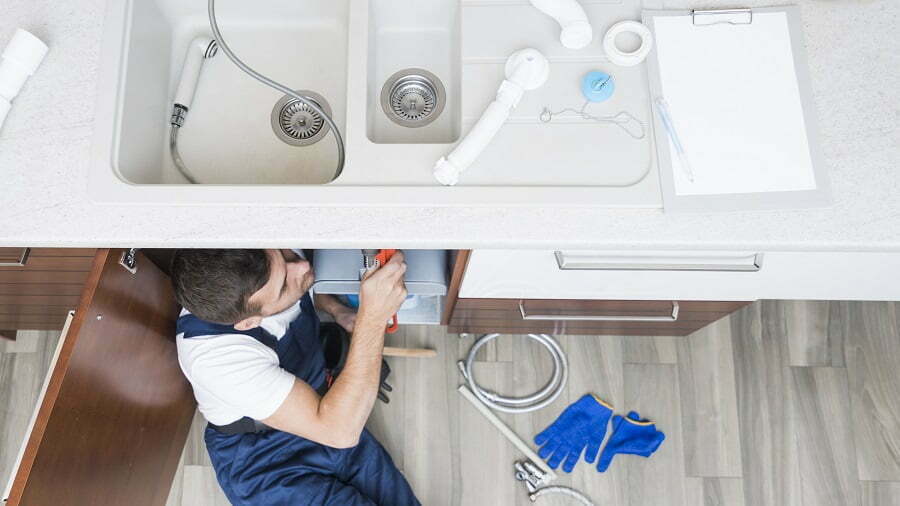Last updated on
When you are a homeowner and you suddenly have to deal with plumbing issues, you cannot just call the caretaker or the landlord. Okay, you don’t have to call a plumber always, sometimes you should be able to fix some simple problems by yourself.
If you know the basics of plumbing, you will save hundreds of dollars, and you will also prevent and be able to fix many common problems around your home.
Plumbing disasters can happen anytime, even though it seems like a dramatic scenario, it happens so often. If you learn how the plumbing system inside your house works, you will be able to prevent some of those disasters. The plumbing system seems like a crazy network of drains, pipes, and appliances, but they all work together and they make your life easier.
As we said, the best way to prevent bad things to happen to your plumbing system is to know how it works. Have a knowledge of basic plumbing problems and solutions and you will be able to avoid a disaster.
We have made a list of 10 plumbing tips everybody should know you should master as a homeowner!
Learn How to Deal with a Leak Under the Kitchen Sink

Before you learn how to fix it, you must know how to locate it. Some of the most common leaks are faucet leak, drain leak, water supply leak, damaged washer, etc. When it comes to faucet leaks, usually O-ring is the one that causes the problem and it has to be replaced. Replacing the O-ring is quite easy and you will need just a few minutes to do it.
First, you should disassemble the faucet from the handle down. Shut the water off the faucet and turn the handles to release any water that might be inside. Pop the cap off, remove decoration caps, loose base of the valve from the faucet body and pull the O-ring of the valve body and slip the replacement on. That’s it, your O-ring is now new and good to go!
Learn Where Your Water Shut Off Valve Is
When you know where to turn your water valve, you will save thousands of dollars, and minimize every major damage that could be made in your house. Water valve supplies your entire home with water, and when you deal with a burst pipe or a major leak, shutting it off will save you from a huge disaster. Normally you can find this valve in the basement or under the sink.
Never Put the Garbage Down the Drain
You should read the manufacturer’s manual for your garbage disposal in order to know what that unit can handle. Never dump food debris, vegetable peelings, or any starchy food – like potatoes or rice, down your drain, because it can cause a lot of problems. Maybe not immediately, but they will eventually clog your drain, and you will have to deal with a huge problem. Prevent it before it happens!
Learn How to Unclog Your Drain
Even if you are careful enough, the drain can clog from time to time. In showers, our hair falls off and over time, it builds up. When you have to deal with a clogged drain, take a snake or similar tool that can pull out anything that is causing the problem and blocking your pipes. Never use liquid drain cleaners, because they are full of chemicals that can harm your plumbing infrastructure.
Over-tightening Isn’t the Best Solution
Never over-tighten your connections and fittings when you secure them. People tend to do that and it is a common plumbing problem in a lot of houses. It can lead to broken bolts and stripped screws. So, when you are securing your fittings and connection remember that hand-tight is just enough!
Take Care of Your Toilet
Never flush hygiene products or paper towels down your toilet. They will get caught in your pipes and make a clog eventually. Be sure to flush only toilet paper and your own waste down the toilet. If you see that your toilet is running, that is a sign that one or more components in your toilet tank need to be replaced. Also, keep in mind that toilet leaks can be so little they don’t make any noise. Check them from time to time!
Clean Often Your Shower and Faucets
Many people don’t know that mineral buildup is a big issue for showerheads and faucets. If you don’t clean it regularly, minerals will make a layer and it will prevent water to go down normally. The good thing is that can be avoided. From time to time, take a small bag, fill it with vinegar, tie it around the showerhead or faucet and let it stay like it overnight. In the morning take the bag off and clean the minerals with a cloth. It is so easy to do!
Low Pressure of Mobile Home Plumbing
If you live in a mobile home, chances are good that you’re going to need to replace your kitchen sink screen at some point. You may want to get one that’s easy to install.
According to Mobile Home Parts Pro, another common reason might be that the pressure-reducing (or relief) valve is clogged.
There are various parts of the plumbing system that can become blocked or dirty. Make sure you’re familiar with these locations and how to clean them.
If you have galvanized pipes slowly closing off with mineral build-up which causes low water pressures, replacement is about all you can hope for if this is causing a plumbing issue.
Trust Plumber’s Tape
The plumber’s tape should be your best friend around your home. This tape can prevent leaks around joints and fittings. Always wrap the tape three times around the pipe threads before sealing. You should have those tapes around all the time. Just be sure to know which tape is for what – white tape is designed for common household plumbing projects and yellow tape is for gas line connections.
Protect Pipes from the Cold
If you live in a place where winters can be pretty cold and the temperature goes often below zero, be sure to prepare your pipes for winter. Get them winterized. Pipe bursts usually happen when people are not at home for a longer period of time, and/or the thermostats are set too low. Maybe you think that way you will save money on your heating bill, but on the other hand, pipe bursts can easily lead to a huge repair bill! Keep that in mind!
Be sure to learn some basic plumbing tips you need to do around your home. From time to time call a plumber for the home inspection. The professional plumber will give you a report about your entire plumbing system and you will know what you can expect in the future.
Recap:



